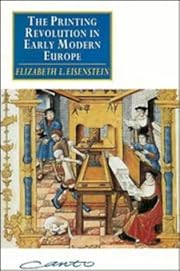

Klik op een omslag om naar Google Boeken te gaan.
|
Bezig met laden... The Printing Revolution in Early Modern Europedoor Elizabeth L. Eisenstein
 Bezig met laden...
Meld je aan bij LibraryThing om erachter te komen of je dit boek goed zult vinden. Op dit moment geen Discussie gesprekken over dit boek.   ) )Really enjoyed this, and I see why it became a must-read for the digerati. The book is fueled by the frustration that, on the one hand, historians say that printing led to immense changes in Europea's culture, and on the other hand, ignore the specifics of printing's impact in more detailed histories of the Reformation, later Renaissance, and scientific revolution. What makes it so thought provoking is that she has a real sensibility to network effects (avant la lettre), understanding how books and printed matter provided the material for a different sorts of interaction, and wider networks of interaction, between people in the Republic of Letters. This approach or point-of-view is what is generalizable to thinking about the impact of the Internet. Of course I also loved the details on the strategies of the earliest publisher/printers, including Platinus (his prints now on show at Singapore's National Museum) and Peter Schoeffer. (Is it a sign??) An excellent introduction to Eisenstein's work. The argument is well-reinforced, but she is not always clear in her organizational choices. The conclusion is a good summation of the points in the work overall. As a librarian and early modern scholar I am certainly going to read the full-length work. When I picked this book up I wasn't aware that I was buying the abridged version (I didn't realize there was an abridged version!). At different points Eisenstein does refer to the larger work, but never quite sounds elitist or pedantic. She does, however, make it clear that the larger work includes content that assumes a different knowledge base than this work. Eisenstein's work is a seminal text and as such can feel like old news. However, she contributed to much of the current discussion of early modern printing and its impact. There are a number of included illustrations, all of engraved illustrations from early modern texts. While Eisenstein does discuss them, she does not offer a structure for "reading" images which would be helpful to readers unfamiliar with early modern uses of images. The lack of quotation attribution is frustrating, but it a direct result of the book's abridgment for a more popular audience. Some quotes are introduced in the text. I would recommend this book for anyone interested in the history of the book, the history of printing, early modern Europe, or related topics. Eisenstein links the printing press to the concept of the Renaissance, the Reformation, and early developments in natural philosophy/science. At times she seems almost wishy-washy in her desire to avoid binary oppositions (or dead-end semantic/pedantic debates). This ambivalence, however, is not uncharacteristic of literary and historical scholarship of the last 30 years. A tolerance for questions rather than answers will assist readers of this work. It sometimes felt like a long slog to get through this book, but I did actually like it. Since I was reading it in preparation for Rare Book School, I did sort of feel that the second part was overkill. Eisenstein had already made most of her points in the first part, and the second just expanded on (and on) those points. But the points themselves are interesting. She details the ways printing had profound effects on (and was in turn affected by) several pivotal movements in Western civilization, including the Renaissance, the Reformation, and the rise of modern science. Very fascinating. But what intrigued me the most was that it was frequently difficult to remember that this book was published in 1983. It so often seems as if Eisenstein must be writing from the perspective of current trends in information studies, sparked by online networked information and communication. Though early in the book, she observes that it's difficult to study the change in mentalities of the already literate elite as text shifted from manuscripts to print, since there's nothing analogous in present times. Can we say yet whether we now have such an analogy? I'm very glad to have read this book. But, I must admit, I'm also glad that this abridged edition was assigned and not Eisenstein's original two volume work. geen besprekingen | voeg een bespreking toe
Onderdeel van de uitgeversreeks(en)La Découverte, Textes à l'appui (Série Anthropologie des sciences et des techniques) Is een verkorte versie van
In 1979 Elizabeth Eisenstein provided the first full-scale treatment of the fifteenth-century printing revolution in the West in her monumental two-volume work, The Printing Press as an Agent of Change. This abridged edition, after summarising the initial changes introduced by the establishment of printing shops, goes on to discuss how printing challenged traditional institutions and affected three major cultural movements: the Renaissance, the Reformation, and the rise of modern science. Also included is a later essay which aims to demonstrate that the cumulative processes created by printing are likely to persist despite the recent development of new communications technologies. Geen bibliotheekbeschrijvingen gevonden. |
Actuele discussiesGeenPopulaire omslagen
 Google Books — Bezig met laden... Google Books — Bezig met laden...GenresDewey Decimale Classificatie (DDC)686.2Technology Manufacture of products for specific uses Books: Binding, Design, Printing PrintingLC-classificatieWaarderingGemiddelde: (3.62) (3.62)
Ben jij dit?Word een LibraryThing Auteur. |
||||||||||||||||||||||||||||||||||||||||||||||||||||||||||||||||||||||||||||||||||||||||||||||||||||||||||||||||||||||||